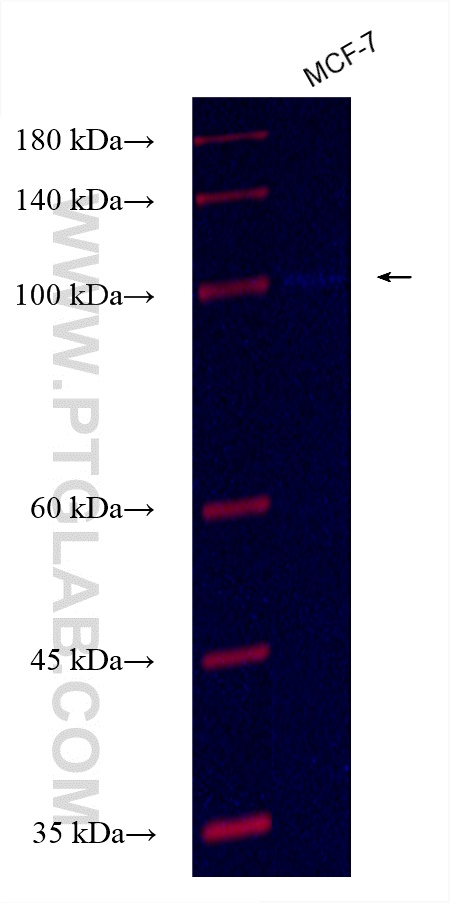验证数据展示
经过测试的应用
| Positive WB detected in | MCF-7 cells |
推荐稀释比
| 应用 | 推荐稀释比 |
|---|---|
| Western Blot (WB) | WB : 1:1000-1:4000 |
| It is recommended that this reagent should be titrated in each testing system to obtain optimal results. | |
| Sample-dependent, Check data in validation data gallery. | |
产品信息
CL750-82983-2 targets TMEM132E in WB applications and shows reactivity with Human samples.
| 经测试应用 | WB Application Description |
| 经测试反应性 | Human |
| 免疫原 |
CatNo: Ag26772 Product name: Recombinant human TMEM132E protein Source: e coli.-derived, PGEX-4T Tag: GST Domain: 468-670 aa of NM_001304438 Sequence: MILPDRRSVRESEDEDEEEEERRQSASRGCTLQYQHATLQVFTQFHTTSSEGTDQVVTMLGPDWLVEVTDLVSDFMRVGDPRVAHMVDSSTLAGLEPGTTPFKVVSPLTEAVLGETLLTVTEEKVSITQLQAQVVASLALSLRPSPGSSHTILATTAAQQTLSFLKQEALLSLWLSYSDGTTAPLSLYSPRDYGLLVSSLDEHV 种属同源性预测 |
| 宿主/亚型 | Rabbit / IgG |
| 抗体类别 | Recombinant |
| 产品类型 | Antibody |
| 全称 | transmembrane protein 132E |
| 别名 | TMEM132E, transmembrane protein 132E |
| 计算分子量 | 116 kDa |
| 观测分子量 | 116 kDa |
| GenBank蛋白编号 | NM_001304438 |
| 基因名称 | TMEM132E |
| Gene ID (NCBI) | 124842 |
| RRID | AB_3673757 |
| 偶联类型 | CoraLite® Plus 750 Fluorescent Dye |
| 最大激发/发射波长 | 755 nm / 780 nm |
| 形式 | Liquid |
| 纯化方式 | Protein A purification |
| UNIPROT ID | Q6IEE7 |
| 储存缓冲液 | PBS with 50% glycerol, 0.05% Proclin300, 0.5% BSA, pH 7.3. |
| 储存条件 | Store at -20°C. Avoid exposure to light. Stable for one year after shipment. Aliquoting is unnecessary for -20oC storage. |
背景介绍
Transmembrane protein 132E (TMEM132E) is a member of the TMEM132 family which also include TMEM132A, TMEM132B, TMEM132C, TMEM132D (PMID: 29088312). The gene of TMEM132E is located within the DFNB99 locus on chromosome 17q12 and is highly expressed in the inner ear and other tissues including brain, kidney, lung, liver, spleen, heart, small intestine, colon, thymus, and stomach (PMID: 31656313). A variant of TMEM132E has been associated with autosomal-recessive nonsyndromic hearing loss DFNB99 (PMID: 25331638).
实验方案
| Product Specific Protocols | |
|---|---|
| WB protocol for CL Plus 750 TMEM132E antibody CL750-82983-2 | Download protocol |
| Standard Protocols | |
|---|---|
| Click here to view our Standard Protocols |


